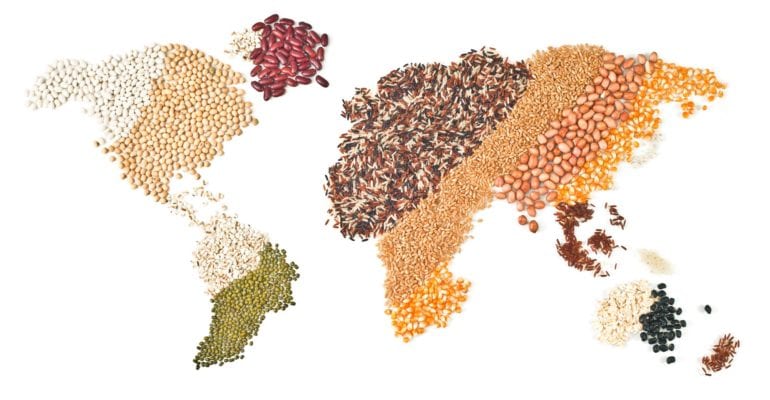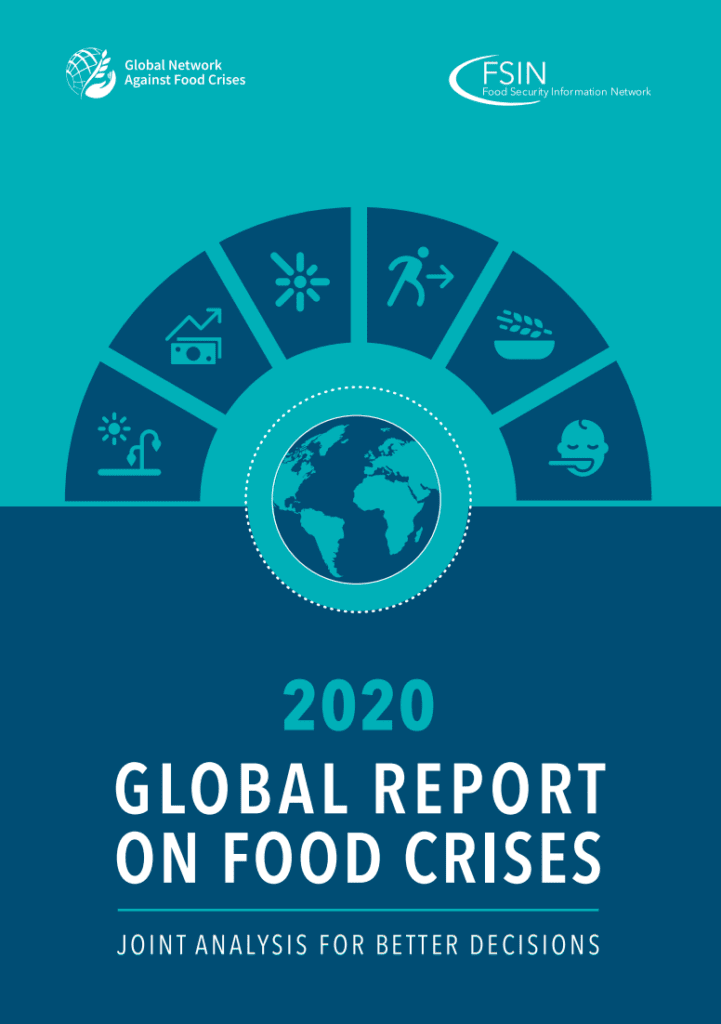SI Representative to the Food and Agriculture Organisation of the United Nations (FAO) in Rome, Liliana Mosca, reports on the impact of COVID-19 on food security across Africa.
“On June 9, in a message at the lunch of a policy brief on food security[1], UN Secretary-General, Antonio Guterres, warned about the impact of coronavirus on food security and nutrition mainly affecting the most vulnerable populations[2]. He declared that the COVID 19 could cause approximately 49 million people to fall below the poverty line[3], thereby worsening their food security. But all is not lost, he declared, if we act swiftly: “Countries need to scale up support for food processing, transport and local food markets, and they must keep trade corridors open to ensure the continuous functioning of food systems.”[4] With this Brief, the Secretary-General reminded us that if countries act fast, the worst effects of the pandemic can be avoided, and that if things are done right, some positive outcomes might follow.“We have an opportunity to build a more inclusive and sustainable world,”[5] Guterres said.
The remarks of UN Secretary-General echoed earlier assessments like the recent 2020 edition of The Global Report on Food Crises. The report[6] warns that the number of people suffering from acute hunger worldwide could double unless urgent measures are taken. In addition, David Beasley, Executive Director of the World Food Programme, said the world had to “act wisely and act fast.” The report estimates that 265 million people in low and middle-income countries will be in acute food insecurity by the end of 2020 unless swift action is taken [7]. Food shortages will be intensified by the lockdown measures and restrictions on trade flow imposed to control the coronavirus pandemic. While at the beginning the focus has mainly been on health issues, in the successive weeks it has become clear that this crisis will have big impacts on food systems, especially in developing countries, in particular in Yemen, the Democratic Republic of the Congo, Afghanistan, Venezuela (Bolivarian Republic of), Ethiopia, South Sudan, Syria, the Sudan, Nigeria and Haiti. African countries face bigger hurdles than any other countries.
Hence, the need for initiatives to favour a more concerted and coordinated international response. One example of such a response can be seen in the extraordinary G20 Agriculture Minister’s Meeting, held by the FAO, the International Fund for Agricultural Development (IFAD), the World Bank, and the World Food Programme (WFP) on April 21, 2020, to address the impact of COVID-19 on nutrition, food security and safety. The Meeting focused on pushing forward the commitment to enhance global cooperation, and ensure and facilitate trade flows of agricultural products to safeguard global food security and nutrition. The Ministers of Agriculture of the G20 adopted a Ministerial Statement [8] on COVID-19, which reaffirms “the importance of working to ensure the continued flow of food, products, and inputs essential for agricultural and food production across borders.” The declaration also points out that G20 countries ” will work together to help ensure that sufficient, safe, affordable, and nutritious food continues to be available and accessible to all people, including the poorest, the most vulnerable, and displaced people in a timely, safe, and organised manner, consistent with national requirements [… ]Continue our cooperation with relevant international organisations and within their mandates work to: reinforce international cooperation”[9].
The impact of COVID-19 on food security and nutrition is likely to be especially severe in countries that were already under strain due to conflict, or experiencing particularly severe natural disasters or sheltering large numbers of refugees [10]. For example, when struck by COVID-19, regions of Africa are faced with simultaneously combatting the pandemic [11] and malnutrition. It is estimated that one in five people are undernourished, including 30% of children under five – approximately 59 million children. Africa has the highest burden of malnutrition compared with other parts of the world, in terms of percentage of the population. As the social and economic impacts of COVID-19, could push 40 to 60 million people globally into extreme poverty, 27 million of whom live in Sub-Saharan Africa the African Union’s Centre for Disease Control (ACDC), realised early that African countries must act collectively to prevent Africa’s first recession in 25 years. Since the beginning of the epidemic 42 African countries have applied some type of border closure, even though this will likely result in damaging socio-economic impacts in particular on food security and nutrition.
To act against COVID-19 challenges on food insecurity and malnutrition, last April the Ministers for Agriculture of African Union Member States publicly committed to: [12]
1. Ensuring that measures are in place to support the food security and nutrition for all and especially for the most vulnerable segment of our populations, with measures to contain the spread of the COVID-19 pandemic while minimising food system disruptions, simultaneously;
2. Providing adequate safety nets, including cash, food, and other relevant social protection measures to support all vulnerable population groups;
3. Ensuring that agricultural actors and activities at all levels, particularly harvests, are not severely affected by the unintended consequences of the containment measures and restrictions on movement, while keeping safe the work environment of producers, traders and workers;
4. Ensuring that as the outbreak unfolds, food and agriculture system activities are carefully monitored and assessed, and all engaging actors are timely and transparently informed and well advised to pursue their operations;
5. Ensuring that farmers have timely access to quality equipment and crop inputs, including seeds and planting material this season;
6. Ensuring that livestock farmers, including pastoralists, and fish farmers have access to corresponding inputs, such as animal feeds and access to pasture as well as quality fish inputs to support the aquaculture industry;
7. Putting in place measures that will reduce food post-harvest losses and thus have more food available in the market”[13].
8. Addressing simultaneously, as governments with our partners, the double burden of COVID 19 and desert locusts, which, together, are challenges of grave magnitude that must be kept at the heart of the urgent work programme in Africa;
9. Working with local leaders to ensure that downstream and upstream food and agriculture markets and the informal food sector, remain open and operate properly, while complying with health and safety guidelines;
10. Working with food and agriculture system traders and transporters, and officials in other sectors and local governments to resolve any bottlenecks affecting the safe movement, transport and marketing of essential people, goods and services in the system.
11. Keeping the national borders open for food and agriculture commodity trade so as not to disrupt regional and interregional trade in food and agriculture products and inputs;
12. Ensuring adequate emergency strategic food reserves and storage facilities, including through public-private partnerships, where appropriate and feasible, and directly linked to the social protection programs;
13. Guaranteeing the role of national leadership in advancing the food security and nutrition agenda to achieve concrete results, through putting in place pragmatic policies and strategies, mobilising and allocating adequate resources, and enhancing institutional capacities and capabilities for accelerated implementation of sustainable food and agriculture systems in an integrated and coordinated manner, even during the COVID-19 pandemic.
14. Redoubling our efforts and concerted actions, in cooperation with all stakeholders, to ensure food security and nutrition for all our citizens during and after the COVID-19 pandemic and to enable meeting Africa’s commitment to ending hunger by 2025.
By taking action now, all nations can build more resilient and productive food systems in the world . The new food system will support food security during the pandemic and beyond and in the long term, nations will better respond to food emergencies and ensure that food needs are fully met [14].”
[1]UN, Policy Brief: The Impact of COVID-19 on Food Security and Nutrition, June 2020
[2] UN Secretary-General, Secretary-General’s video message on COVID-19 and Food Security and Nutrition, https://www.un.org/sg/en/content/sg/statement/2020-06-09/secretary-generals-video-message-covid-19-and-food-security-and-nutrition-scroll-down-for-french-version
[3] UN, Policy Brief, p.3
[4]UN Secretary-General, Secretary-General’s video message on COVID-19 and Food Security and Nutrition, cit.
[5] Idem
[6] The alarm comes from the Global Food Crisis Report (GRFC 2020), created by a global humanitarian network made up of 16 partners, including the FAO (United Nations Food and Agriculture Organization), WFP (World Food Program) and UNICEF (United Nations Children’s Fund) see: Global Network against Food Crises-Food Security Information Network, Global Report on Food Crises (GRFC 2020). Joint Analysis
[8] G20 Extraordinary Agriculture Ministers Meeting, Ministerial Statement on COVID-19 Virtual Meeting – April 21, 2020, https://g20.org/en/media/Documents/G20_Agriculture%20Ministers%20Meeting_Statement_EN.pdf
[9] Idem
[10] The humanitarian conditions of the refugees are extremely fragile in East and Horn of Africa, the Great Lakes Region and in the Sahel; See: UNHCR, East and Horn of Africa, and the Great Lakes Region COVID-19 External Update (24-30 April 2020), https://reliefweb.int/report/sudan/unhcr-east-and-horn-africa-and-great-lakes-region-covid-19-external-update-24-30-april; Idem, Appeals for US$ 186 million for Refugee and Displacement Crisis in Sahel, https://reliefweb.int/report/world/unhcr-appeals-us-186-million-refugee-and-displacement-crisis-sahel
[11]At the date of June 13 the impact of Covid in Africa is: 225,126 cases; 6,051 deaths; 102,912 recoveries and 116,163 actives cases. According to the WHO mos of the Africant deaths – more than 70 per cent – are occurring in only five nations: Algeria, Egypt, Nigeria, South Africa and Sudan. South Africa is the most affected country, with one-quarter of the continent’s total cases. See
Africa CDC Dashboard, https://au.int/en/covid19; COVID-19 in Africa: WHO urges constant vigilance as cases top 200,000, https://news.un.org/en/story/2020/06/1066142
[12] AU, FAI, Ministers for Agriculture of African Union Member States Declaration on Food Security andNutrition diuring the Covid 1i9 Pandemic 16 April 2020, https://au.int/sites/default/files/documents/38439-doc-ministerial_declaration_en.pdf
[13] Idem, pp.4-6
[14] In a virtual roundtable dedicated to Africa titled “Resilient World : An African Call for a New World Order.” African heads of state and governments asked for a new world order.See: New York Forum Institute, Resilient World: An African Call for a New World Order” on May 19th. https://richardattiasassociates.com/www/raa/media/13may-nyf-africa-press-release-eng.pdf



Dear Sir or Madam,
My name is Payton Sondashi, owner of Farm Lot Katikulula/780 in Katikulula Resettlement Scheme, Chitambo District (formerly part of Serenje District), Central Province of Zambia.
We are currently involved in Soya, Cassava and Maize farming. For the years 2021 and 2022 farming season (next season), we would like to scale up in production, expand market and also our workforce in order to meet local and international demand.
And also, the lower part of the farm has an all year flowing stream that also consists of a wide area suitable for animal or fish farming. We would like to start fish and pig farming provided the availability of resources.
In order to achieve the above we would like to gain access to a loan or other form assistance from your reputable organization.
I also possess excellent skills and experience in management information systems – MIS, computer networks, training, management and administration.
With the skills and experience above, we would also like to explore and embark on how we can use solar energy and also how to apply Information and communications technologies – ICTs in our rural set up to: –
· Add value to our production
· Produce better quality yields
· Have higher crop production
· improve our Communications, management and administration.
For the reasons above, we also would like to humbly ask for technical expertise, grant/loan, training and capacity building in order to grow our business, scale up our operations in terms of activities, create and expand our market and client outreach.
Hoping to positively hear from you, Your help will be appreciated.
Sincerely yours,
Payton Sondashi.